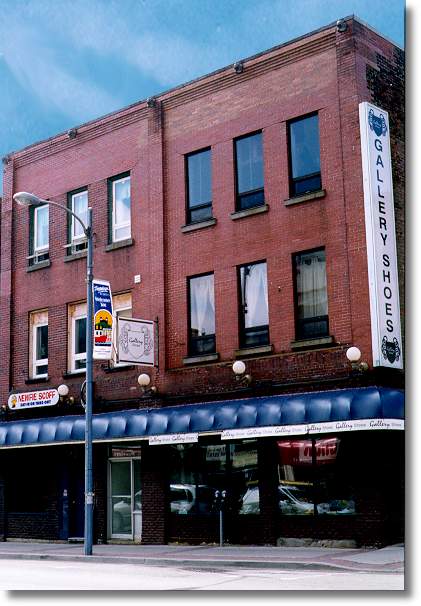Ladies' Reading Room
28. Go down the stairs beside #275 to reach Water Street. Across Water Street, at #158, was the Ladies Reading Room.
The Ladies' Reading Room, opened in 1910, was crucial to the development of the women's suffrage movement in Newfoundland. Within its walls a generation of influential St. John's women were politicized and informed about issues affecting their lives.

Founded in 1909 by a group of women in response to being banned from attending lectures at a male club, the Ladies' Reading Room was in "a large and airy room" in the Lyon's Building, 158 Water Street. Situated on an upper floor it had a panoramic view of the Narrows, and its location on a busy shopping thoroughfare was inviting. It was open all day from ten until six, and the terms of membership, namely three dollars and the introduction of one member, made it accessible to at least the middle class.
Within a few weeks of its opening, 125 women had joined. The Ladies' Reading Room provided social space, a selection of "the best English and American papers and magazines", and lectures and debates sponsored by the Current Events Club which met on Saturdays. Discussions on socialism, religions, women's status in society, occupations open to women, the education of girls, and gaining the vote were held there. Many of those active in the suffrage movement - Armine Gosling, Myra Campbell, Janet Ayre, Mary Southcott - were members and gave talks.
Significant talks promoting women's suffrage were distributed to local newspapers, not all of which were sympathetic to the cause. Some newspaper columnists argued women do not possess the power to reason so should not be given the vote. Even church leaders derided the women from their pulpits, declaring them selfish and callous.
Despite such antagonistic views, the opportunity to present their ideas helped women develop confidence as public speakers. Giving papers, debating and analyzing issues, all within a socially respectable atmosphere defined by cups of tea and genteel female company, supported their struggle.
The Ladies' Reading Room and Current Events Club (later renamed The Old Colony Club) was instrumental in the fight for women's rights in Newfoundland.
Previous Stop - Dora Russell | Next Stop - Eleanor Power
Return to Women's History Walking Tour Guide




